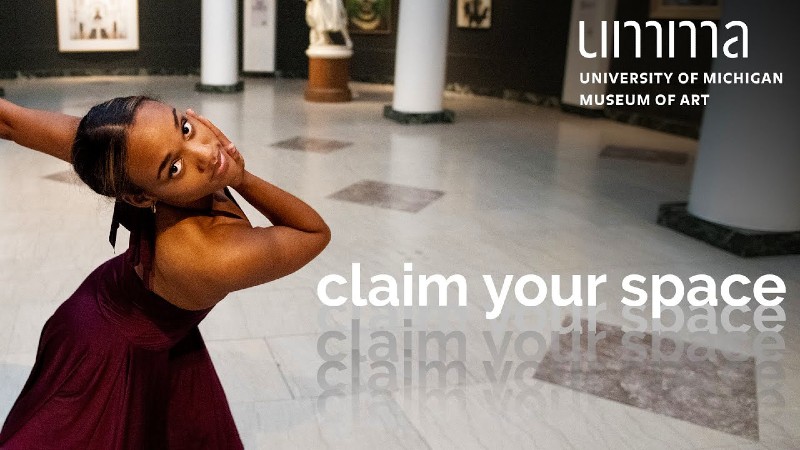UMMA's "Claim Your Space" campaign encourages people to find their place at the museum

Ostensibly, the "Claim Your Space" promo video was made to highlight the University of Michigan Museum of Art's extending its Thursday through Sunday hours starting Sept. 7 and a new effort to attract people to the building.
But the video isn't just an ad for UMMA; it's a work of art that stands by itself and shows off the immense creative talent of the U-M students who made it.
Dancer, choreographer, and U-M School of Music, Theatre & Dance student Lauren Roebuck plays an UMMA gift-shop employee who is locking up for the night. But as she walks through the Lizzie and Jonathan Tisch Apse in the Alumni Memorial Hall, Roebuck imagines herself as a dancer and proceeds to shimmy, sway, and leap all around the museum, her moves inspired by the art that surrounds her.
Fellow SMTD student Samuel Uribe-Botero provides the glitchy electronic soundtrack and Filmic Productions at the University of Michigan captured Roebuck's dance and expertly edited the movements to sync with the tune.
Director Charlotte Beggs, story director Benjamin Servetah, producer Morgan Kowalewski, and production crew members Lauren Trail, Samantha Cantie, Ed Shimborske did such a nice job of filming Roebuck's expressive and inviting dance, UMMA might have a problem with people being inspired to drop some legs and get down in front of the artwork during the middle of the day.
Dancing in a museum just looks like a hella lotta fun.
In an article written by Lilian Varner for U-M News, Christopher Ankney, UMMA director of marketing and public relations, said the “Claim Your Space” campaign is about making people feel like they belong at the museum:
We want to recognize that there are many who haven’t felt welcome or haven’t seen themselves represented on the museum walls in the past. We want people to know that everyone’s story and experience has meaning and a place in history—and we’re working to right that wrong.
In the same piece, UMMA Director Christina Olsen said:
This is an important time for UMMA because people are still reeling from the ongoing pandemic, the country’s racial reckoning and a truly tumultuous year and a half. Museums are unique places where people can come together to reflect on what we’ve been through and to heal. Being present with art helps people interpret the past and present and put their own experiences in a larger context. It helps us reflect and make meaning of our lives.
The story also highlights the current exhibitions and some upcoming ones:
Unsettling Histories: Legacies of Slavery and Colonialism: This exhibition critiques long histories of art museums favoring colonial voices. Updated labels about works in UMMA’s collection, new works from contemporary artists and a confrontation of uncomfortable truths reveals a more complex and honest view of 18th and 19th century American and European art. On view now.
Oh, Honey … A Queer Reading of UMMA’s Collection: What makes a work of art, or a space, queer? Who decides? In a first for UMMA, student fellow Sean Kramer presents an exhibition of art in UMMA’s collection, curated from his unique lens as an LGBTQ+ graduate student at U-M. Opening Aug. 21.
We Write to You About Africa: Doubling the space dedicated to African art at UMMA, this exhibition explores the ways in which Africa and the art of the African diaspora has been treated in the Global North. Opening Aug. 21.
Wish You Were Here: African Art and Restitution: In this exhibition, UMMA will host an in-public investigation into 11 works of African art in the museum’s collection. Visitors—in-person and online—will have access to documents, photographs and correspondence that are being used by UMMA to develop a better understanding of each object’s history. The museum will grapple, in real time, with questions surrounding legal and ethical ownership of these artworks. Opening Aug. 21.
Christopher Porter is a library technician and the editor of Pulp.


































